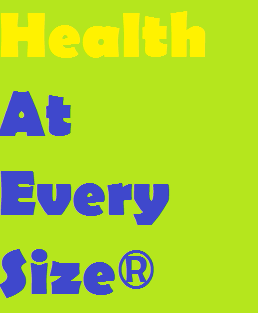Read the blog
What HAES® is Not
There are a lot of misconceptions about Health at Every Size®, even among people who know that dieting is futile. I want to talk about them here and why they are just plain wrong.
Misconception #1: HAES® is just an excuse to overeat all the time.
Why it’s wrong: You might have missed it, but “health” happens to be the first word in Health at Every Size®. Is constantly overeating healthy? I think most of us can agree it is not. The opposite of restrictive eating is not overeating, it is freedom to eat, which is a very different thing than overeating. In fact, many studies on restrictive eating show a strong association with overeating, which means that you are more likely to frequently binge-eat while on a diet than you are not dieting. HAES® emphasizes getting in tune with internal signals of hunger and fullness to help guide eating, and contrary to popular dieting belief, most people will not eat themselves to death if the reigns come off. So HAES® is not an invitation to overeat to discomfort more, it’s actually enabling us to do it less.
Misconception #2: HAES® is “letting yourself go” and not worrying about health.
Why it’s wrong: Once again, notice the word health in HAES®? The only thing you let go of with HAES® is trying to manipulate your body size – which is largely dictated by genes, not to mention a whole host of other things – into something that might not be natural, or even possible, for you. You can still work on eating well, increasing the amount of exercise you get and managing your stress – all things that will help improve your health – which is challenging enough without having to worry about shrinking yourself to someone else’s idea of a “healthy” size.
Misconception #3: HAES® doesn’t work because fat is just unhealthy.
Why it’s wrong: This is just plain untrue and the evidence supports that. Numerous studies show good health doesn’t require thinness, only good health habits. Specifically the work of Matheson et al, Bacon and Aphramor, and Mann and Tomiyama have shown that healthy habits such as eating more fruits and vegetables and getting regular exercise, not smoking and avoiding excessive alcohol consumption have all improved health and that weight loss does not necessarily improve all parameters of health. Meanwhile, there are exactly zero studies to show that long-term (>5 years) significant weight loss is possible for more than a tiny fraction of people. So we don’t need to keep throwing the same worthless intervention (weight loss) at people to make them healthy; we just need to enable people to engage in healthy habits (if they choose, since health is not an obligation) to help them be healthier. Duh.
If you continue to feel skeptical about HAES® and still think weight loss is the one true way, ask yourself this: who makes money from HAES®? Is there a $72 billion industry that is fueled by self-acceptance and the adoption of healthy habits? No. You likely can achieve these things on your own and improve your health without spending an extra dime. The diet industry doesn’t care if we become healthier, it only cares that it can sell the dream of weight-loss over and over again, often to repeat customers. That is one of the best rationales for Health at Every Size®.

Reblogged this on Joanne Arena MS, RD and commented:
I loved this post and had to share it….
This is excellent! One thing I think we can do for girls is to encourage them to NEVER DIET. So if they don’t get on the diet train, they have better long-term health. I did try to diet once (pressure in college for a brief time), but thankfully most of my life I didn’t. I have always been very athletic, and today I weigh 5 pounds more than I did in high school (and I am 5’9″ tall). We can get off the diet train, as HAES encourages, or we can never even get on, which is even better.
I 100% agree! I wish girls (and now even boys) never felt compelled to diet. I never dieted in school (thankfully), and I think if I did the damage to my metabolsim would have been so much worse. Thanks for your comment!
[…] What HAES® is Not. […]
I’m doing a lecture at Stanford in October (to student athletes) and I’m going to use and reference this. Cool? cool. 🙂
But of course! Very cool!
[…] Dare to Not Diet article about what HAES is NOT: https://daretonotdiet.wordpress.com/2015/05/11/what-haes-is-not/ […]